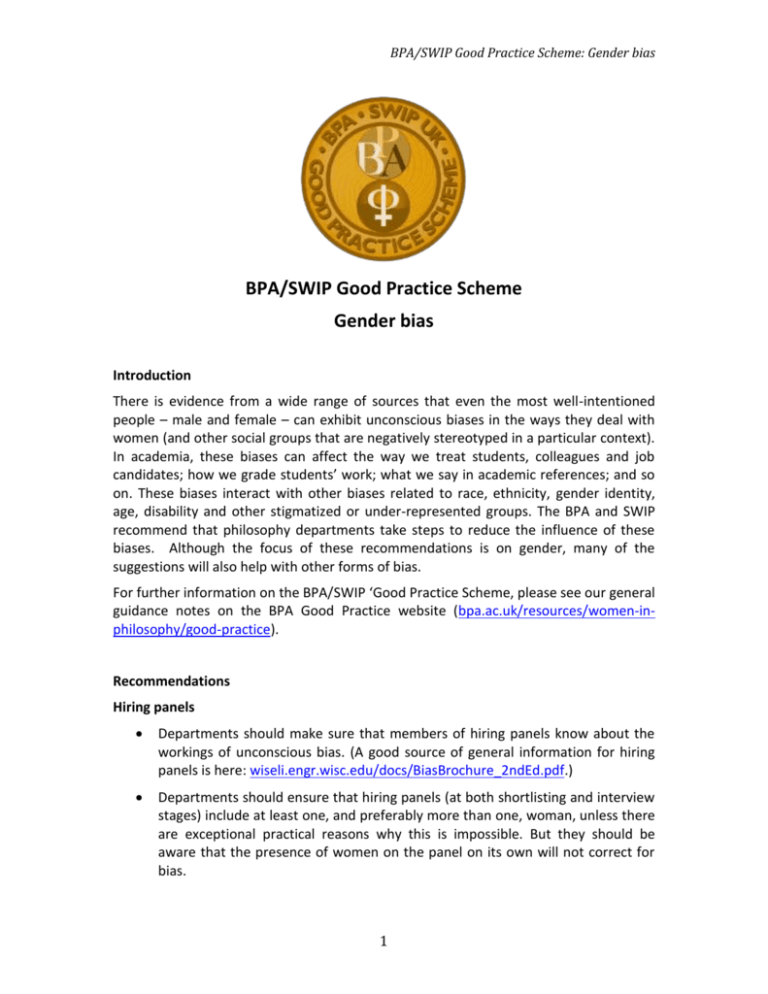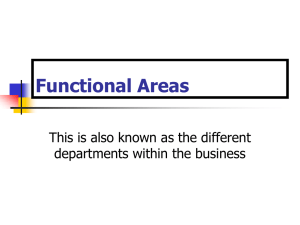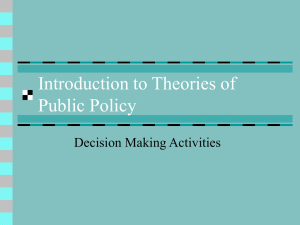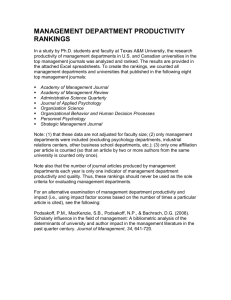BPA/SWIP Good Practice Scheme Gender bias
advertisement

BPA/SWIP Good Practice Scheme: Gender bias BPA/SWIP Good Practice Scheme Gender bias Introduction There is evidence from a wide range of sources that even the most well-intentioned people – male and female – can exhibit unconscious biases in the ways they deal with women (and other social groups that are negatively stereotyped in a particular context). In academia, these biases can affect the way we treat students, colleagues and job candidates; how we grade students’ work; what we say in academic references; and so on. These biases interact with other biases related to race, ethnicity, gender identity, age, disability and other stigmatized or under-represented groups. The BPA and SWIP recommend that philosophy departments take steps to reduce the influence of these biases. Although the focus of these recommendations is on gender, many of the suggestions will also help with other forms of bias. For further information on the BPA/SWIP ‘Good Practice Scheme, please see our general guidance notes on the BPA Good Practice website (bpa.ac.uk/resources/women-inphilosophy/good-practice). Recommendations Hiring panels Departments should make sure that members of hiring panels know about the workings of unconscious bias. (A good source of general information for hiring panels is here: wiseli.engr.wisc.edu/docs/BiasBrochure_2ndEd.pdf.) Departments should ensure that hiring panels (at both shortlisting and interview stages) include at least one, and preferably more than one, woman, unless there are exceptional practical reasons why this is impossible. But they should be aware that the presence of women on the panel on its own will not correct for bias. 1 BPA/SWIP Good Practice Scheme: Gender bias Departments should agree specific hiring criteria (and their weighting) in advance and stick to the agreed criteria (and weighting). As far as possible, departments should strive to allow sufficient time for nonrushed consideration of job applications. Departments should consider ways of anonymising parts of their hiring process (e.g. by considering writing samples anonymously), and implement any ways of doing so that are practically feasible. Teaching Departments should make sure that those involved in teaching know about the workings of unconscious bias. Information about and discussion of gender bias should be included in any training or induction sessions run by the department for staff, including teaching assistants. Departments should practise anonymous marking at all levels, and maintain anonymity in determining degree classification, as far as practically possible. Promotions and appraisals Departments should make sure that those involved in the promotions and appraisals processes know about the workings of unconscious bias. Promotions committees/Heads of Department should, where consistent with institutional policy, ask for CVs from all eligible department members, rather than inviting specific members of staff to apply or only considering those who put themselves forward. Research Excellence Framework Departments should make sure that those involved in REF selection know about the workings of unconscious bias, and also that they are fully informed of REF policies regarding leave for caregiving. Departments should consider anonymising outputs that are under review when deciding which to include. General Departments should help to break down stereotypical associations of philosophy with maleness, for example by striving for diversity in seminar speakers, syllabi and course reading lists; ensuring that pictures of philosophers/students on websites etc. include women; etc. It is worth also worth giving thought to how women are included. Adding women in the final week of a module, or only to provide a feminist perspective, can give an impression that women’s contributions are secondary or limited. Ideally, they should be fully integrated into the syllabi. Specific proposals and/or targets should be discussed and agreed by the department – see below for some suggestions – and progress monitored. 2 BPA/SWIP Good Practice Scheme: Gender bias Departments should consider ways of facilitating broad participation in seminar discussion periods, so that pushier individuals do not dominate and a constructive tone is maintained. See below. Insulting, aggressive and unprofessional behaviour should not be tolerated – whether from staff (including support staff and teaching assistants) or students. This includes, but is not limited to, dismissive remarks about the intellectual abilities of certain sorts of people; hostile questioning and or/excessive interruption of speakers; and gratuitous sexual comments. Departments should try to ensure that all staff and students feel comfortable in dealing with such behaviour in the most appropriate manner (see the link on bystander training in the Good Practice document on sexual harassment). Some suggested ways of breaking down gender stereotypes Aim to ensure that a specified minimum number of publications by women appear on all course reading lists and/or are set as required seminar reading. Ensure that pictures of women philosophers are in a prominent position e.g. on the departmental website and on walls. These might be, for example, past or present members of staff or past visiting speakers. The APA have some posters for sale, available at www.zazzle.com/apacsw. Adopt an official departmental ‘seminar conduct’ policy. See the BPA Good Practice Website, under ‘Conferences and seminar series’, for some specific proposals you might consider implementing. These include such proposals as a ‘one question per question’ rule, having brief break prior to the question period, and giving priority to those who rarely speak. List academic staff on the website/in student handbooks alphabetically rather than in order of seniority. More suggestions, along with links to further information (e.g. relevant literature) can be found on the BPA Good Practice website. If your department has done anything that has worked well, please let us know so that we can add it to the list of suggestions on the website. 3






